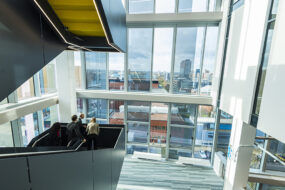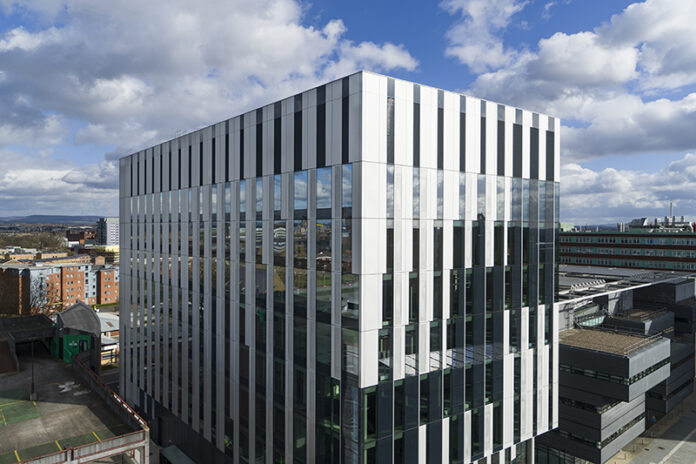Manchester’s Henry Royce Institute for advanced materials research and innovation celebrated a key milestone earlier this year ahead of the new national hub becoming fully operational in 2021.
The Royce Hub Building based at The University of Manchester forms part of a growing network of facilities across the Institute’s Partner organisations: the National Nuclear Laboratory, UK Atomic Energy Authority, Imperial College London and the Universities of Cambridge, Leeds, Liverpool, Oxford and Sheffield, providing access to state-of-the-art equipment to academia and industry.
Extending across 9 floors and located at the heart of The University of Manchester’s campus, it will foster world-class collaborative research in tandem with industry to act as an international convener for materials research excellence.
Following the construction phase, the Royce Hub Building was handed over by the contractors Laing O’Rourke in March 2020 and the first operational staff were just hours away from moving in before non-essential facilities closure was initiated in line with government guidance.
Progress on the interiors still continues and the Institute can now share a first look inside the £105m building which will act as a national hub for driving advanced materials research, development, and commercialisation in the UK.
Contractors continue the fit-out to minimise disruption when equipment and staff move in following The University of Manchester’s phased reopening of the campus. The first labs are expected to be completed towards the end of 2020.
The building will host £45 million worth of new equipment, as well as existing facilities in Manchester for biomedical materials, metals processing, digital fabrication, and sustainable materials research including the new Sustainable Materials Innovation Hub part-funded by the European Regional Development Fund. Alongside this will be collaborative space for industry engagement, helping to accelerate the development and commercialisation of advanced materials for a sustainable society.
The building and new equipment, totalling £150 million, forms part of the wider £235m investment by the Engineering & Physical Sciences Research Council across Royce’s national partnership. Investment has also be made by The Wolfson Foundation to support the biomedical materials facility within the building.
 Regius Professor of Materials and Royce Chief Scientist Philip Withers said: “The new Royce Hub Building will act as a centre of scientific excellence for advanced materials and a meeting place for the national community. By bringing together the UK’s academic and industrial materials leaders, Royce will identify new opportunities, workshop ideas, and develop new strategies and approaches to tomorrow’s materials demands.”
Regius Professor of Materials and Royce Chief Scientist Philip Withers said: “The new Royce Hub Building will act as a centre of scientific excellence for advanced materials and a meeting place for the national community. By bringing together the UK’s academic and industrial materials leaders, Royce will identify new opportunities, workshop ideas, and develop new strategies and approaches to tomorrow’s materials demands.”
Professor David Knowles, CEO of the Henry Royce Institute said: “Royce has come a long way since its inception in 2016 and the handover of the new Royce Hub Building in Manchester represents the next chapter in our story. Although COVID-19 has delivered some unprecedented challenges and delays, we are confident that the physical space will demonstrate that the national institute is truly open for business. We can now look to address challenge-led research that will have positive impact on UK and global citizens, underpinning the Royce vision of ‘Advanced Materials for a Sustainable Society’.”
Manchester is a world-leader in developing new and existing materials and is already known globally as the home of graphene – a game-changing two-dimensional material first isolated at The University of Manchester in 2004.
Dr Diana Hampson, Director of Estates for The University of Manchester commented “We are delighted to have successfully delivered the construction phase of the Henry Royce Institute Hub Building which sits alongside the University’s growing advanced materials campus including the National Graphene Institute and the Graphene Engineering Innovation Centre. The research that will take place in these buildings will consolidate Manchester’s role at the centre of materials characterisation – measuring and exploring materials that will help us fully understand their properties and potential.”







